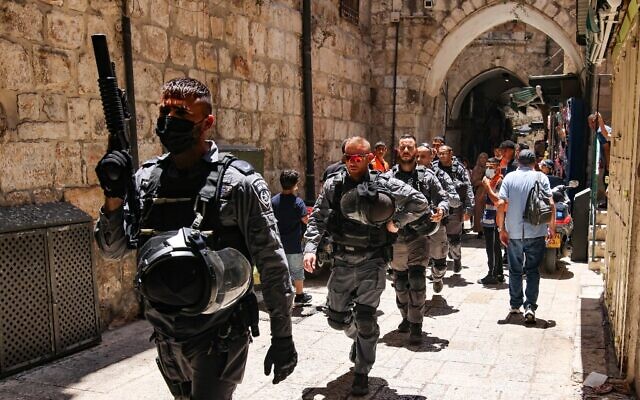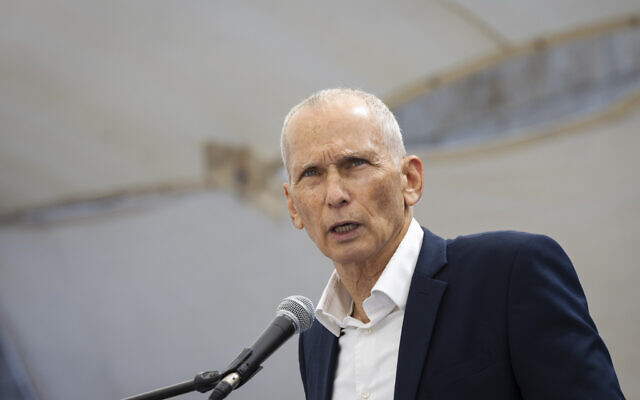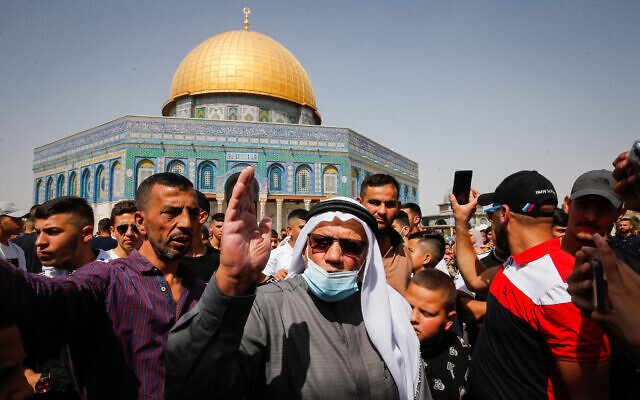A Jerusalem judge upheld a police order in which a Jewish man was caught praying on the Temple Mount, overturning a lower court ruling that supported the man’s quiet prayer, which critics have called Said there could have been widespread unrest.
The Jerusalem District Court’s decision came after Police Minister Omar Barlev appealed a magistrate’s ruling in the case a day earlier, and warned that the ruling could lead to violent protests, apparently upholding the long-standing religious order at the holy site. Under American pressure to keep.
In the ruling, District Court Judge Arya Romanov said that Jews were barred from worshiping openly at the site, where only Muslims are currently allowed to pray.
The case revolves around the police decision in which a Jewish man was seen praying under his breath from the site for 15 days. The magistrate’s court judge ruled that since the prayer was not performed quietly and openly, it could not pose a security risk, which the police use to justify the enforcement of the prayer ban.
But Romanov noted that the fact that the defendant was caught served as evidence against the calm of the prayer.
“What is important… is the fact that there was a person who saw the appellant praying, who is believed to have appeared prayer. If it had not appeared, no one would have noticed it,” Romanov wrote.
Romanov also ruled that the officer exercised reasonable discretion in removing the man from the site and therefore had no grounds for an earlier intervention by the Jerusalem Magistrates’ Court to lift the 15-day ban.
Concerning what happens when openly praying, Romanov refused to dwell on the matter. He also did not say whether the rules for prayer at Temple Mount are too strict or there is room for flexibility in enforcing restrictions.

Members of the Israeli security forces walk toward the entrance of Temple Mount during the Tisha Bav (Ninth) fasting day on July 18, 2021. (Ahmed Gharbali/AFP)
Under the understanding formed after Israel captured the Old City and East Jerusalem in the 1967 war, Jews are allowed to go there, but not pray there. Israel maintains overall security at the site, but the Muslim Waqf manages religious activities there. Police have enforced the Jewish prayer ban as a public safety measure for decades.
The Temple Mount, known to Muslims as Haram al-Sharif, is the holiest site for Jews and the third holiest pilgrimage site in Islam. It is the emotional epicenter of the Israeli-Palestinian conflict, and tensions there helped ignite the 11-day Gaza War in May.
In a statement earlier on Friday, Barlev said he had appealed the lower court’s decision, warning that “a change in the current status quo would jeopardize and jeopardize public peace.”

Public Security Minister Omar Barlev attends a ceremony at the National Headquarters of the Israel Police in Jerusalem on September 5, 2021. (Olivier Fitoussi/Flash 90)
An Israeli official told The Times of Israel that the statement was issued after officials from the administration of US President Joe Biden arrived in Jerusalem about the matter.
According to the source, US officials were concerned that the magistrate court’s decision could lead to an escalation in violence and urged the government to clarify its position on the matter.
The State Department did not respond to a request for comment.
“The State of Israel advocates freedom of worship and prayer for all, however, given the security implications, the status quo must be adhered to,” Barlev said.
NS prior court ruling The focus was on eliminating the man’s ban from the plaza. Magistrate courts make up the lowest level of the Israeli judiciary and try cases involving relatively minor crimes.
Judge Bilha Yahlom had said that the man, “like many others, prays on a daily basis on the Temple Mount.”
“The appellant was standing in the corner with a friend or two, there was no crowd around him, his prayer was quiet, whispered,” she said.
“I did not find that the religious acts committed by the appellant were external and visible,” she ruled, determining that such prayer “did not violate police instructions,” and rescinded her ban from the site.

Palestinians protest the acceptance of a ‘quiet’ Jewish prayer by an Israeli court at Temple Mount in Jerusalem’s Old City on October 8, 2021. (Jamal Awad/Flash 90)
The Jordanian-run Islamic Waqf, which is the Temple Mount overseas, called the magistrate court’s decision a “clear violation” of the sanctity of the complex and a “clear provocation” to Muslims around the world.
“This decision also has no validity because we do not recognize Israeli law on al-Aqsa,” the mosque’s director, Sheikh Omar al-Kiswani, told AFP.
Minor changes in the status quo at the holy site or even rumors of such changes have sparked violent protests in the past. In 2017, the decision to install metal detectors and cameras on the compound following an attack sparked days of angry protests and condemnation from Israel’s Muslim neighbors.
Agencies contributed to this report.